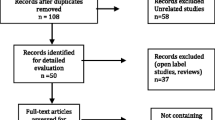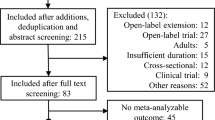Abstract
To systematically review studies evaluating pharmacological treatment intervention of the atypical antipsychotic induced weight gain in the pediatric population and summarize the current evidence of the pharmacological treatment. According to the preferred reporting items for systematic reviews and meta-analyses (PRISMA) guidelines, we searched the various databases Medline, PubMed, PubMed central (PMC), CINAHL, and clinicaltrial.gov. until Jan 30th, 2022 for relevant clinical studies. Medical subject heading (MeSH) terms or keywords were used, "Body Weight," "Weight Gain," "Weight Loss," "Body Weight Maintenance," "Pediatric Obesity" in "Pediatrics," "Adolescent," "Child" in context of "Antipsychotic Agents" and "Drug Therapy," "Therapeutics," "Treatment Outcome," "Early Medical Intervention." We used the PICO algorithm for our search (Population, Intervention, Comparison, Outcomes, and Study Design) framework. The initial search included 746 articles, nine studies were ultimately selected in the final qualitative review. We included relevant clinical reviews, case series, and randomized clinical trials that evaluated pharmacological intervention for antipsychotic-induced weight gain in the pediatric population. Non-peer-reviewed, non-human, non-English languages article was excluded. Metformin is the most studied medication for antipsychotic-induced weight gain in children. Three studies have shown that adding Metformin to the antipsychotics can significantly reduce the body weight and body mass index with mild transient side effects. Other adjunct medications like topiramate, amantadine, betahistine, or melatonin vary greatly in mitigating weight with various side effects. Lifestyle modification is the first step in dealing with AIWG, but the result is inconsistent. Avoiding the use of antipsychotic in children is preferred. Adding an adjuvant medication to the antipsychotic could prevent or mitigate their negative metabolic effect on the body weight and body mass index. Metformin has the most evidence, topiramate, betahistine, amantadine, and melatonin is possible alternatives in the pediatric patient without changing their antipsychotic medication. Other viable options show some benefits but need further clinical studies to establish efficacy and safety.


Similar content being viewed by others
References
Dayabandara M et al (2017) Antipsychotic-associated weight gain: management strategies and impact on treatment adherence. Neuropsychiatr Dis Treat 13:2231–2241. https://doi.org/10.2147/NDT.S113099
Klein DJ et al (2006) A randomized, double-blind, placebo-controlled trial of metformin treatment of weight gain associated with initiation of atypical antipsychotic therapy in children and adolescents. Am J Psychiatry. 163(12):2072–2079. https://doi.org/10.1176/ajp.2006.163.12.2072
Perry BI et al (2021) Longitudinal trends in childhood insulin levels and body mass index and associations with risks of psychosis and depression in young adults. JAMA Psychiatry 78(4):416–425. https://doi.org/10.1001/jamapsychiatry.2020.4180
Shin L et al (2008) Overview of obesity in children with psychiatric disorders taking atypical antipsychotics 2008. Harv Rev Psychiatry 16(2):69–79. https://doi.org/10.1080/10673220802073915
Leo RJ et al (2000) Atypical antipsychotic use in the treatment of psychosis in primary care prim care companion. J Clin Psychiatry. 2(6):194–204. https://doi.org/10.4088/pcc.v02n0601
Maayan L et al (2011) Weight gain and metabolic risks associated with antipsychotic medications in children and adolescents. Child Adolesc Psychopharmacol. 21(6):517–535. https://doi.org/10.1089/cap.2011.0015
Arman S et al (2008) Randomized, double-blind, placebo-controlled trial of metformin treatment for weight gain associated with initiation of risperidone in children and adolescents. Saudi Med J. 29(8):1130–1134
Anagnostou E et al (2016) Metformin for treatment of overweight induced by atypical antipsychotic medication in young people with autism spectrum disorder: a randomized clinical trial. JAMA Psychiatry. 73(9):928–937. https://doi.org/10.1001/jamapsychiatry.1232
Correll CU et al (2020) Metformin add-on vs antipsychotic switch vs continued antipsychotic treatment plus healthy lifestyle education in overweight or obese youth with severe mental illness: results from the IMPACT trial. World Psychiatry. 19(1):69–80. https://doi.org/10.1002/wps.20714
Canitano R et al (2005) Clinical experience with Topiramate to counteract neuroleptic induced weight gain in 10 individuals with autistic spectrum disorders. Brain Dev. 27(3):228–232. https://doi.org/10.1016/j.braindev.2004.06.006
Ellinger LK et al (2010) Efficacy of metformin and topiramate in prevention and treatment of second-generation antipsychotic-induced weight gain 2010. Ann Pharmacother 44(4):668–679. https://doi.org/10.1345/aph.1M550
https://www.accessdata.fda.gov/drugsatfda_docs/label/2012/020844s041lbl.pdf
Gracious BL et al (2002) Amantadine treatment of psychotropic-induced weight gain in children and adolescents: case series. Case Rep J Child Adolesc Psychopharmacol Fall 12(3):249–257. https://doi.org/10.1089/104454602760386941
https://www.accessdata.fda.gov/drugsatfda_docs/label/2009/016023s041,018101s016lbl.pdf
Smith RC et al (2018) Betahistine effects on weight-related measures in patients treated with antipsychotic medications: a double-blind placebo-controlled study. Psychopharmacol (Berl). 235(12):3545–3558. https://doi.org/10.1007/s00213-018-5079-1
Mostafavi Seyed-Ali et al (2017) Melatonin for reducing weight gain following administration of atypical antipsychotic olanzapine for adolescents with bipolar disorder: a randomized double-blind, placebo-controlled trial. J Child Adolesc Psychopharmacol. 27(5):440–444. https://doi.org/10.1089/cap.2016.0046
Savage RA et al (2020) Melatonin. Stat Pearls Publishing, Tampa
https://www.accessdata.fda.gov/drugsatfda_docs/label/2018/206321s007lbl.pdf
Larsen JR et al (2017) Effect of liraglutide treatment on prediabetes and overweight or obesity in clozapine- or olanzapine-treated patients with schizophrenia spectrum disorder a randomized clinical trial JAMA. Psychiatry 74(7):719–728. https://doi.org/10.1001/jamapsychiatry.2017.1220
https://www.accessdata.fda.gov/drugsatfda_docs/label/2012/085128s065lbl.pdf
Ryder JR et al (2017) Effect of phentermine on weight reduction in a pediatric weight management clinic. Int J Obes (Lond) 41(1):90–93. https://doi.org/10.1038/ijo.2016.185
Hoyoung AN et al (2013) Phentermine. Sibutramine and affective disorders. Clin Psychopharmacol Neurosci 11(1):7–12. https://doi.org/10.9758/cpn.2013.11.1.7
Roeri JL et al (2009) An exploration of the effect of modafinil on olanzapine associated weight gain in normal human subjects. Biol Psychiatry. 65(7):607–613. https://doi.org/10.1016/j.biopsych.2008.10.037
Patricia Ball M et al (2011) Placebo-controlled trial of atomoxetine for weight reduction in people with schizophrenia treated with clozapine or olanzapine. Clin Schizophr Relat Psychoses 5(1):17–25. https://doi.org/10.3371/CSRP.5.1.3
Nwosu BU et al (2011) A potential role for adjunctive vitamin D therapy in the management of weight gain and metabolic side effects second-generation antipsychotics. JPEM 2011:300
Shivakumar V et al (2012) Successful use of add - on topiramate for antipsychotic - induced weight gain. Indian J Psychol Med. 34(1):85–86. https://doi.org/10.4103/0253-7176.96168
Shapiro M et al (2016) Topiramate, zonisamide and weight loss in children and adolescents prescribed psychiatric medications. Int J Psychiatry Med 51(1):56–68. https://doi.org/10.1177/0091217415621266
Praharaj SK et al (2012) Amantadine for olanzapine-induced weight gain: a systematic review and meta-analysis of randomized placebo-controlled trials. Ther Adv Psychopharmacol 2(4):151–156. https://doi.org/10.1177/2045125312440441
Kang D et al (2018) Effect of betahistine and metformin on antipsychotic-induced weight gain: an analysis of two clinical trials. Front Psychiatry 9:620. https://doi.org/10.3389/fpsyt.2018.00620
Libowitz et al (2021) The burden of antipsychotic-induced weight gain and metabolic syndrome in children. Front Psychiatry 12(12):623681. https://doi.org/10.3389/fpsyt.2021.623681
https://www.accessdata.fda.gov/drugsatfda_docs/label/2012/020766s029lbl.pdf
Joffe G et al (2008) Orlistat in clozapine- or olanzapine-treated patients with overweight or obesity: a 16-week randomized, double-blind, placebo-controlled trial. J Clin Psychiatry 69(5):706–711
Calargeet CA et al (2012) Correlates of weight gain during long-term Risperidone treatment in children and adolescents. Child Adolesc Psychiatry Ment Health. 6:21. https://doi.org/10.1186/1753-2000-6-21
Funding
None.
Author information
Authors and Affiliations
Contributions
WA worked on the title, introduction, PRISMA, discussions, limitations, and results. KS worked on methodology and PRISMA. CT worked on the methodology, risk of bias, and quality assessment. WA, AM independently reviewed the selected relevant articles. All authors except YA, equally searched, cross-checked, summarizing relevant articles, and independently reviewed and edited this review. SJ and ZM share senior authorship and supervision. YA only reviewed the grammar, punctuation and style of writing.
Corresponding author
Ethics declarations
Conflict of interest
None.
Additional information
Publisher's Note
Springer Nature remains neutral with regard to jurisdictional claims in published maps and institutional affiliations.
Rights and permissions
About this article
Cite this article
Al Jumaili, W., Muzwagi, A., Shah, K. et al. Pharmacological Interventions of Atypical Antipsychotics Induced Weight Gain in the Pediatric Population: A Systemic Review of Current Evidence. Child Psychiatry Hum Dev 55, 479–487 (2024). https://doi.org/10.1007/s10578-022-01424-6
Accepted:
Published:
Issue Date:
DOI: https://doi.org/10.1007/s10578-022-01424-6




